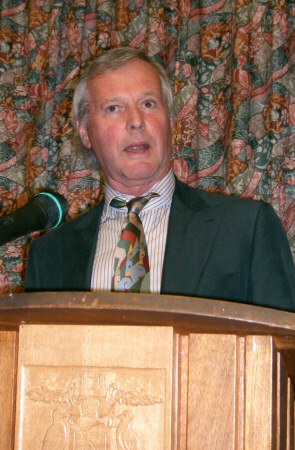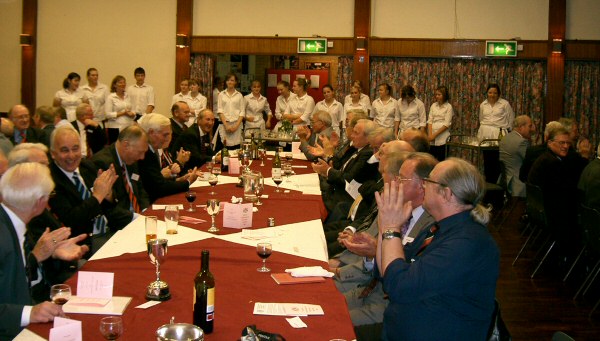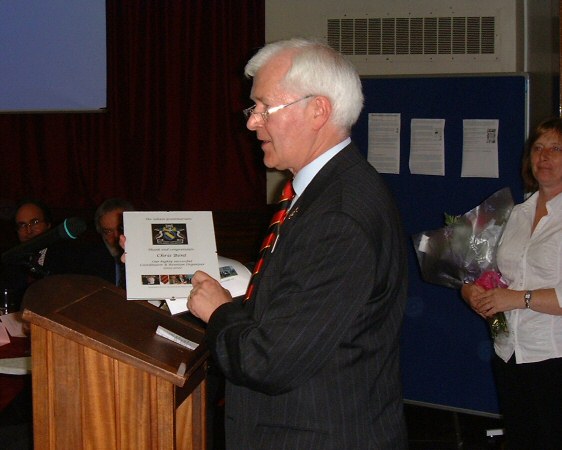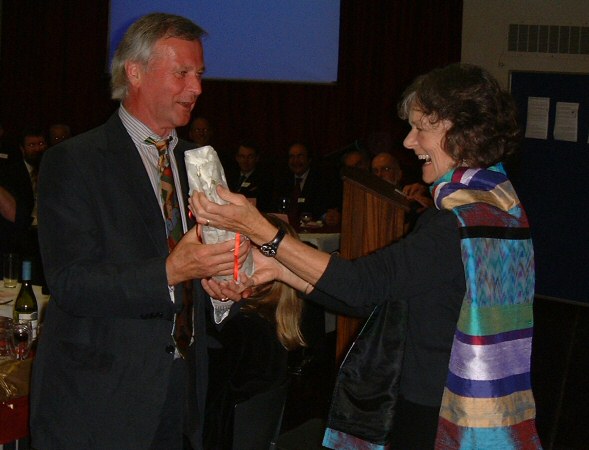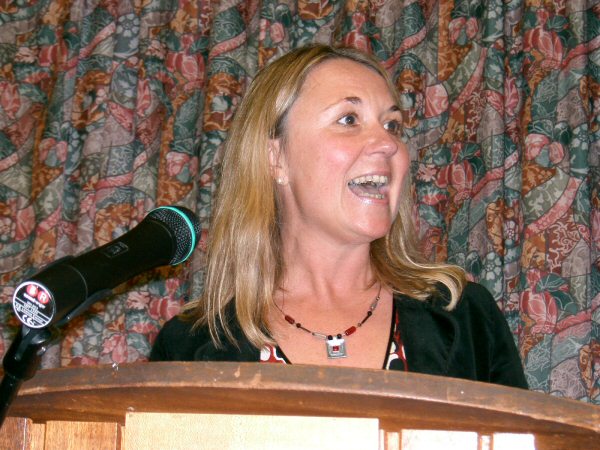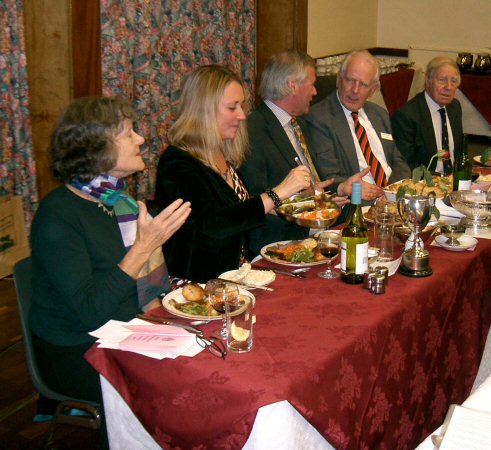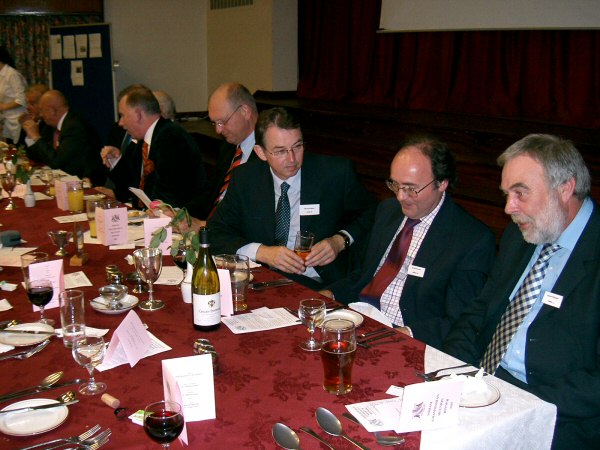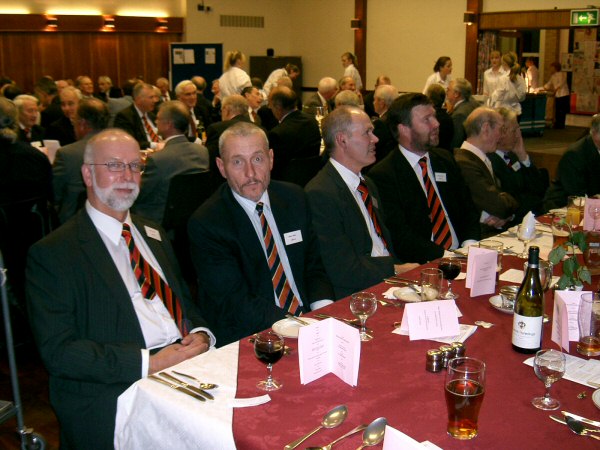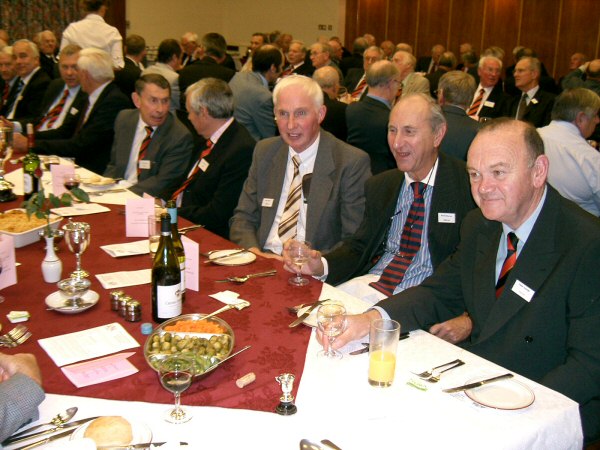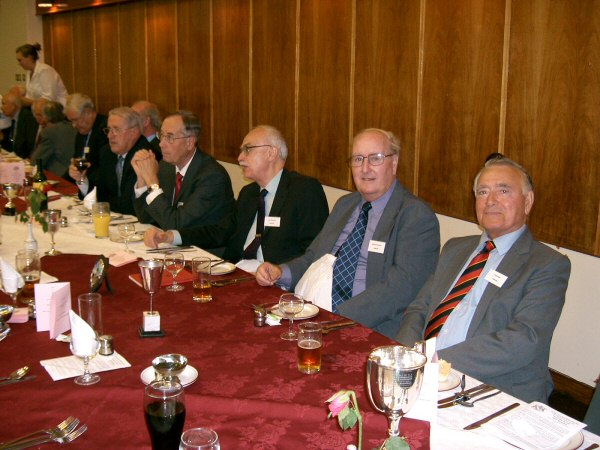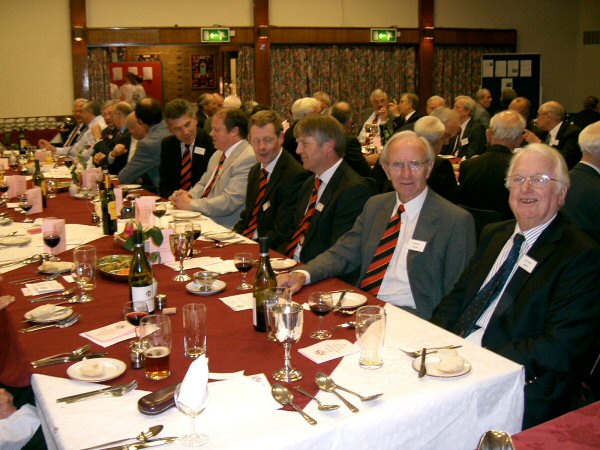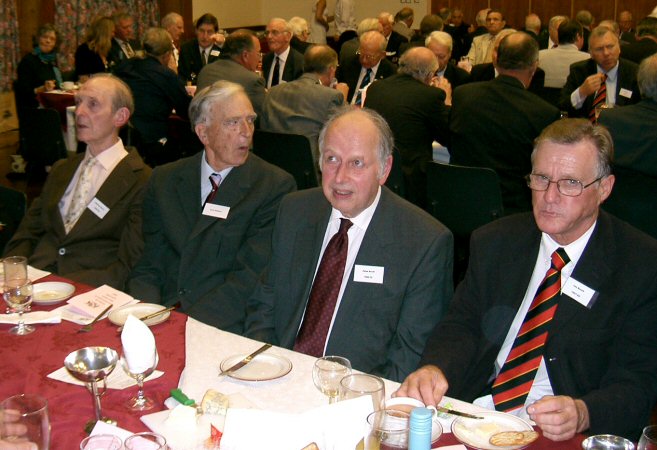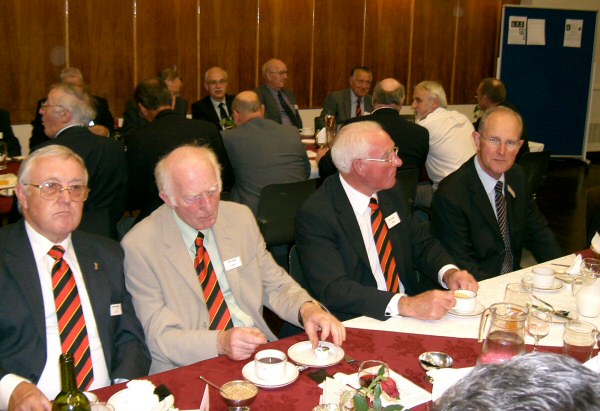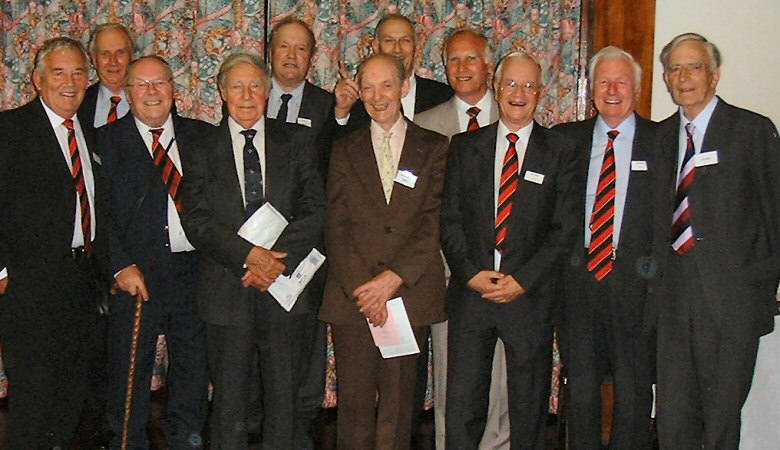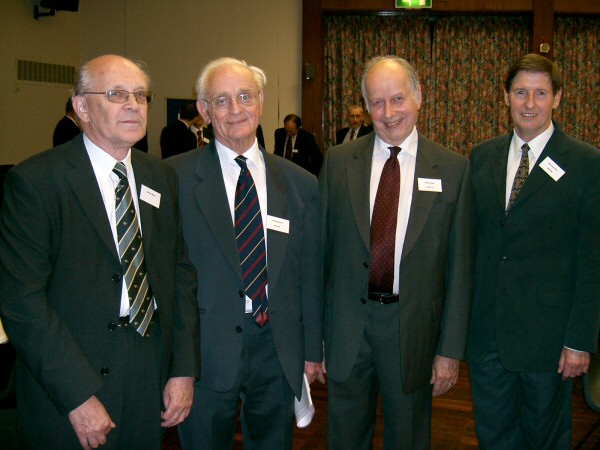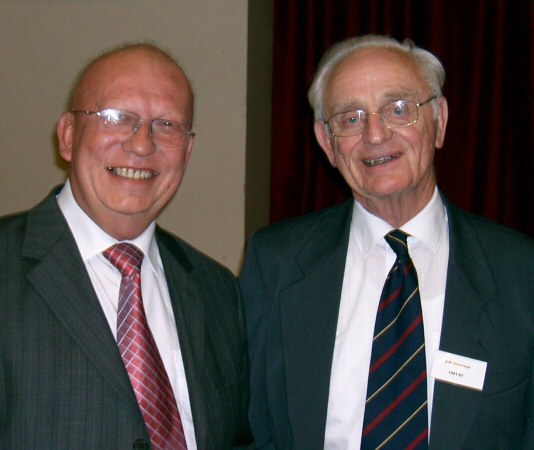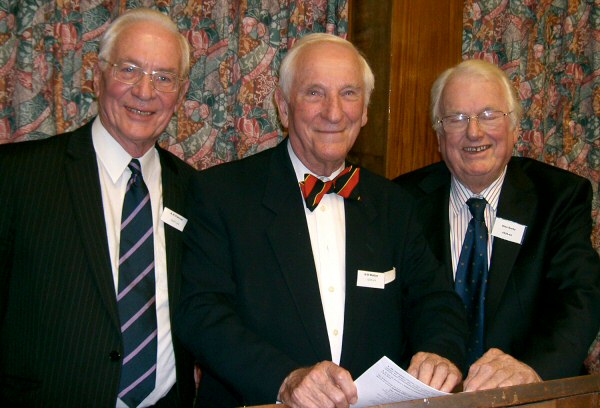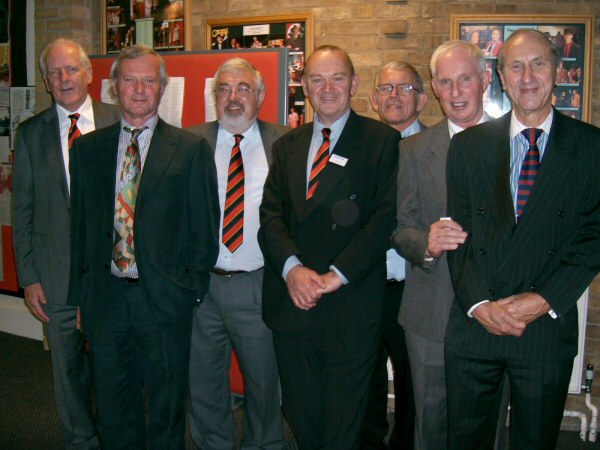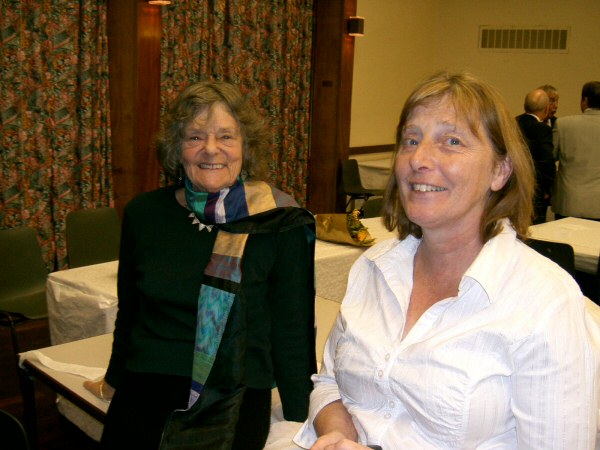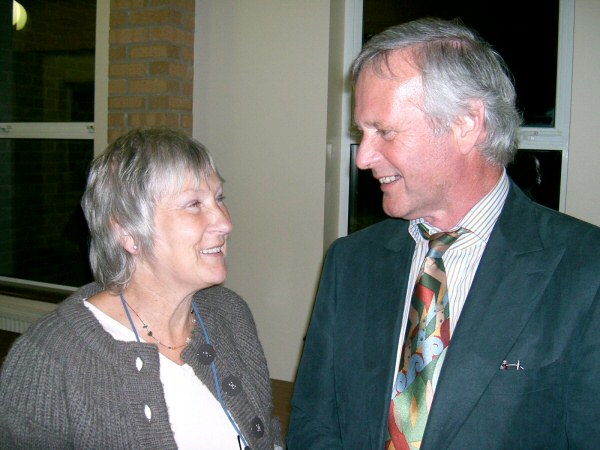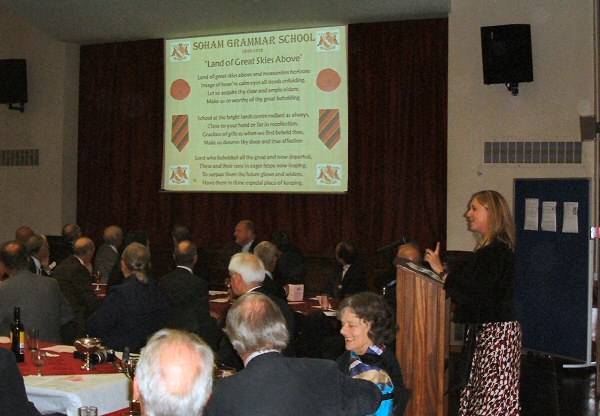
Having a go: Lane
Guest Speaker -
Denis Wilkins
Chris Bent introduced Denis Wilkins
53-61, FRCS (Eng), Hon. FRCPSG, MD. Hon. Consultant
Surgeon, Derriford Hospital, Plymouth, Hon. Senior
Lecturer Peninsula Medical School. Denis is immediate
past president of the Association of Surgeons of
Great Britain and Ireland, with a distinguished
career spanning appointments throughout Great
Britain, Europe and Canada.
Denis: I have to say, that
applause before a speech is an act of hope; during is
an act of faith, and afterwards is an act of charity!
Good evening, Principal Carin Taylor, Ladies and
Gentlemen .. and Chris Bent.
I have to say that Chris and I have been very good
friends over the years. In fact, when Chris and I
were in the sixth form we were pretty well joined at
the hip. We agreed later that would be the last time
that we would sniff glue together. So, thank you very
much, Chris, for asking me to do the after-dinner
slot.
|
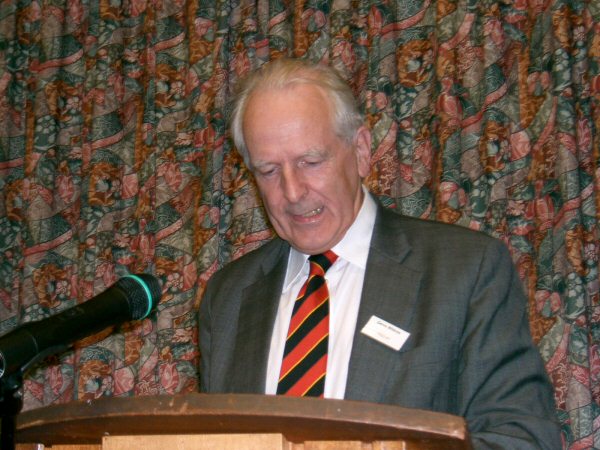 |
To get us off the mark so to speak, it
crossed it crossed my mind that as we are in school, we might
as well do some learning. In picking a subject that might be
useful, I was reminded how much business we have to carry out
over the 'phone these days and how important it is to
communicate accurately critical words, such as post codes.
Sometime ago, I came across a neat little way of learning the
NATO phonetic alphabet. Listen carefully and pay attention,
please, as if we have time I intend to test you at the end of
this talk - providing you are still here:
A is for Alpha, which is really all
Greek;
B is for Bravo, three cheers, so to speak;
C is for Charlie, a Drake with a smile;
D is for Delta, the mouth of the Nile;
E is for Echo, a sonar type ‘ping’,
F is for Foxtrot a dancing type thing,
G is for Golf, played with ball and with club;
H is for Hotel, a posh kind of pub;
I is for India, which is far, far away;
J is for Juliet, as in Shakespear’s play,
K is for Kilo, a thousand to you.
L is for Lima, which is in Peru;
M is for Mike, makes your voice loud and clear; |
N is for November, quite late in the
year.
O is for Oscar, a ‘wild’ kind of chap;
P is for Papa, a backwards ‘apaP’;
Q is for Quebec, which is over the sea;
R is for Romeo, ‘neath Juliet’s balcony;
S is for Sierra, some mountains in Spain;
T is for Tango, a dancing type thing;
U is for Uniform, which is black, green or blue;
V is for Victor, the man who beat you;
W is for Whisky, which T-totallers deride;
X is for X-ray, to see your insides
Y is for Yankee, a New England man, and
Z is for Zulu, who’s black - or dark tan! |
So there you have it. (I believe that this
was composed in the 1950s and wish that I could give due
credit but the author’s name is lost in the mists of
time)
Actually one has to be very careful about delivering talks
in schools. Occasionally, if there had been a last-minute
cancellation by the preferred speaker, I might be dragged out
to deliver a speech day talk or similar, surgeons being
regarded as semi-respectable members of the Establishment and
just about acceptable, in this regard.
I remember one occasion with some humour. I had been asked
to give the prizes at the local boys’ school. In
retrospect, matters started to unravel from the outset when
the rather elderly and clearly slightly deaf chairman of the
Governors introduced me. Having explained to him that my main
hobby of the time was ‘aerobatics’, he finished his
very kind introduction with, “…..but even in his
busy life he manages to find time to indulge his passion
which is aerobics .... and he even competes in National
Aerobic Competitions …”
With my credibility among the predominantly male audience
severely dented, I embarked on a rather suspect story abut a
disruptive Jewish schoolboy and the local Catholic school,
which I thought went down rather well [tells the story].
Afterwards, over tea, the headmaster, rather cruelly I
reflected later, took pains to introduce me to two particular
members of the Board of Governors; one being the local rabbi
and the other the local catholic bishop.
In pondering on what we might chat about this evening, it
seemed to me that as the occasion is very much to do with our
old school, and that I am just one of its
‘products’, it might be interesting to explore how
the grammar school education of the time fitted this person
for a career as a surgeon.
Here it is important to remark that we received a large
dollop of our education at SGS, but the training really came
later. The difference? Well I can illustrate this by pointing
out that I was very happy to have any one of my four
daughters educated in matters to do with sex, but not quite
so keen to have them undergo training in the subject!
So how did the education here at school fit into life
afterwards – certainly as far as I was concerned?
I was a lad who moved from the Technical stream to the
Latin stream in mid school. (Aside: ‘No ‘A’
and ‘B’ stream here; both recognised as different
but of equal worth; Edward Armitage’s touch asserting
itself once more). It was Mr. Webb (Ffuff –Ding)
our then form master who fixed this. Why and how? On account
of a fad I was going through having just read the Practical
Home Doctor and blurting out when quizzed with the rest
during a Friday afternoon form period (Do you remember
those?) that I “wanted to be a doctor”. All in the
heat of the moment and for want of something better to say.
Ridiculous, really, but then all of us can probably look
back on a seemingly whimsical urge or moment that turned out
to shape our course through life. I never really knew how,
but the next day he told me to move my stuff to the L stream
and use the Latin periods to catch up (Sorry, Rex Waller!). I
owe him big time and take the opportunity to say a big
‘thank you’ as he must have gone to considerable
lengths.
I was very happy in the technical side, particularly
enjoying TD (technical drawing) and woodwork with Mr.
‘Tabby’ Tabraham (If you read this Mr. Tabraham,
please note that I kept up the woodworking and have one two
small prizes from Good Woodworking magazine over the
years to show for it. I applied the techniques you taught us
for many years to good effect while doing orthopaedics so
your efforts were not entirely in vain! I wonder how many of
us still have our oak knife boxes proudly in use.)
Now to follow a career in surgery, what are the physical
and mental attributes required and how do they fit with SGS?
A wag once said that for success in medicine one needed
grey hairs for gravitas and a full bladder to ensure a look
of concern, but speaking personally I think that there is
just a little more to it than that.
First, I would put stamina, Mental and
Physical. One has to be very tough to survive surgical
training and subsequent practice. The physical demands of
long hours, lengthy operations and chronic lack of sleep take
some getting accustomed to. So do you remember those long
cross-country runs? Across the bottom of the playing fields,
through the kissing gate, up the drove, over the Horse Fen
with 10lb of clay clinging to each of your
‘plimsolls’ [interjection from the audience:
“and don’t forget the ice!”], pounding along
the road and so back to the school.
‘RAT’ Taylor great master that he was, was never
much into us I think, and like quite a few classmates I was
no good at ball sports, so we more or less got on with it and
rolled the cricket pitch and went on runs and played in the
remnants (‘Remmies’). What we did not perhaps
appreciate was how endurance sports such as these during
adolescence imparted benefits that would subsequently last
throughout life. During those teenage days we were
stimulating our hearts and lungs during a critical time when
they could still respond by growing.
We had, when I was in the Sixth, a graduate from Cambridge
on teaching experience who was an endurance runner. At last,
a soul mate! Inspirational. Someone who through example,
brought on a whole tribe of us during the year he was here. I
wonder what became of him. So to RAT and his general ethos of
sport for all, and to the school I would say my second big
thank you. I see from SVC Principal Taylor’s excellent
overview that the tradition of sporting achievement continues
in ‘our’ school today.
But it is also mental stamina that is
even more important in a medical or surgical career.
Let’s face it; when things are going well there can be
no finer feeling. Accolades, grateful patients and relatives
- what more could one want? Unfortunately, matters do not
always go that way. Surgical mistakes, unforeseen
complications and poor decisions all become readily apparent.
Attending a sick patient for days and nights while the
illness and your management runs its course; and the nagging
doubts about whether you should have done this, that or the
other. Working in unresponsive and often poorly managed
institutions. These strains, hidden from all but your family,
can take a dreadful toll. (‘.. From bitter searching of
the heart, we rise to play a greater part …’, from
a Villanelle for our times by
Frank R. Scott (1899-1985)).
And so one needs mental fortitude. To
pick oneself up, resolve to do better and just get on
providing the best care for one’s patients (‘Do not
go gentle into that good night .... Rage, rage against the
dying of the light’ - Dylan Thomas). Looking back, these
were the values that we picked up from the atmosphere of
‘stiff upper lip’: the encouragement of our masters
when we screwed up; the drip feed of wise teachings and
exposure to great reading material that would probably be
dismissed as positively jingoistic today.
Incidentally, it is probably important that, as a surgeon,
one should not have too much imagination, otherwise you would
stand rooted to the spot in terror. [Here is told a
scurrilous and probably apocryphal anecdote about medical
students, Samantha and Leroy].
| Physics.
I would single out the sciences in which we were
given our grounding here, and physics in particular,
as arguably the most practically useful part of my
education. Someone described physics as helping us to
understand the world around us, and I think that
describes the discipline exactly. The fascinating
thing is that the respective elements of a broad
education, such as we received at Soham, are rarely
wasted and it is remarkable how seemingly irrelevant
learnings and skills will come in useful time and
time again and when you least expect it. As a
young doctor, I was employed by the British Antarctic
Survey for a spell. I was also doing my postgrad
doctorate. We were just dropped off by the polar
vessel M.V. Perla Dan at a station on the
Brunt Ice Shelf, Halley Bay, and picked up a year
later. No physical support possible and radio
communication only intermittent in those days. So
when I found that a vital piece of my research kit
was not working – a temperature sensitive probe
– I cadged a thermistor from a friend in the met
room and used a Wheatstone Bridge and the off-balance
current to devise a practical temperature measuring
system.
I wouldn’t have thought of it without the
physics teaching given by Messrs Armitage, Webb and
others.
|
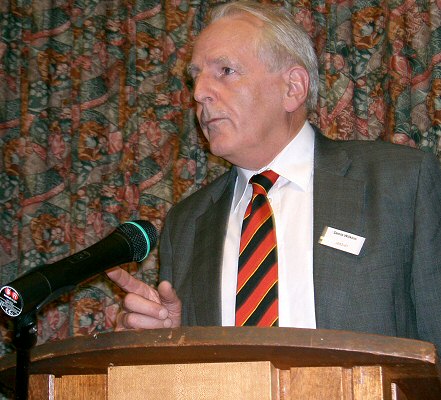 |
During my particular leisure interest,
which you will gather has always been aviation, a knowledge
of physics and chemistry is invaluable. Boyles' Law, Charles'
Law, relative humidity, hydrocarbons, laminar flow, etc. all
suddenly become relevant. It is sometimes critical.
Twelve years ago or so, a few of us bought an aerobatic
plane. It was called a Pitts Special [here, a
show of hands demonstrated that about a third of the audience
knew the aeroplane, and one had actually flown one] and
although we weren’t doing a lot of display flying, we
were having a huge amount of fun doing amateur competitions
around the place. Two of us who were particularly keen, would
meet at ‘Bodmin International’ airfield on a Friday
lunchtime and would pile into this open cockpit, two-seater
and off – usually to remote airfields in E. Anglia.
Funnily enough, not many people seemed keen on having a load
of would-be top guns buzzing over their houses like demented
bluebottles during summer week-ends.
On this particular day, I couldn’t go on account of
work. So my friend went off on his own. I wrote to the
aerobatic association afterwards in the following terms:
| ODE to a PITTS Special The
Cornish lot are out this season,
I guess that you will know the reason;
Poor old “Top Gun’s” stuffed the bus
On the way to Sleap – it happened thus:
Lost and fuel was almost gone,
Found Shropshire’s fields were full of corn.
At last he finds one – looks grass;
Even on a lowish pass.
The approach was good – the flare was fine;
Better get it right this time!
But what is this – Oh no! Oh Rats!
The sound of wheat ears on the spats!
Throttle’s firewalled-
Where’s the power?
G- PEAL hangs there ... for about an hour…
But it’s no good the wheat ears win –
There is no doubt she’s going in.
|
The Lomcovak was pure erudition-
It should have won a competition,
But on the ground it was sort of fake,
And also made his poor head ache.
Apart from which it wore the Pitts,
Which seemed to want to come to bits.And as he
seeks the sequence card,
Up comes the cockpit combing – hard,
And upon this and the dash,
The poor chap’s cranium takes a bash.
And what a thump – he’s dead for sure!
But no, he’s coming back for more!
And out he climbs to survey the wreck,
With nothing more than aching neck
Although he’s feeling pretty sore
He’s no more brain damaged than he was before.
He’s sure our fitter will be mad,
But on the other hand we’re glad
Because instead of hospital he’ll go home,
Because he wore a strong bone dome!
|
Not an easy plane to fly and navigate the
Pitts Special and he had in fact overlooked a simple physics
lesson re magnetic fields and had placed a magnetic
stop-watch holder next to the compass .....
You can appreciate that I have a bit of a love for
rhyming; poetry even. I don’t think that I was the most
diligent or rewarding student of History or English, but it
must have gone in. You do need a decent amount of English to
survive in medicine and communicate properly. Even so,
mistakes will happen. I had a typed letter of mine returned
to me by a GP friend the other day “ … I saw this
patient today for a quick check ..” with the blue line
round ‘check’. Except that it was spelt
‘cheque’. And he would appreciate to be sent an
appointment for one as well.
But I must have picked up something of an appreciation for
the richness and the beauty of the English language (after
all we were a Grammar School) and while in the Antarctic,
with time to fill by reading during the four month winter
darkness, I found that I actually liked poetry. To explain,
when embarking on lengthy dog-sledging journeys each of us
was only allowed to take one book. I had taken an anthology
of poetry by that great WW2 general, Lord Wavell, entitled Other Men’s Flowers and
gradually, it opened a whole range of new horizons.
When one is sledging either with dogs or by man-hauling,
it has to be the most boring occupation imaginable. Also, if
the weather turns, the two of you can be holed up in a tent
for days at a time with nothing to do but listen to the gale
howling and hoping that the tent is well fastened down.
Boring and often very hard work. I learned many poems by
heart and my companions and I quickly found that the exercise
of pulling them out of the hard drives of our collective
memory; reciting and discussing even, could divert us for
hours at a time from the cold, grey realities of the
seemingly endless ice-shelf. So thank you, our masters, for
giving us Mr. Polly and Rudyard Kipling.
I notice that Leon Kitchen who instilled in so many of us
the framework of our British heritage, is here tonight and I
have just had the pleasure of making the acquaintance of John
Browning, also a history master at SGS. I am afraid that,
coming from Plymouth, I cannot possibly resist the
opportunity of putting them right with regard to that most
famous of battles, Trafalgar.
[Here recited ‘The Battle of Trafalgar’
from the Stanley Holloway Monologues, by Marriot Edgar]
There are other medical snippets of dubious nature that I
could offer. For example, news that the eczema Society has
just launched a new scratch card, which is proving very
successful among its members. And those people who said mouth
transplants couldn’t be done are surely laughing on the
other side of their face!
But that is enough of this nonsense for one evening. It is
an honour to be given the opportunity to talk and reminisce,
as is our wont, about our School. This is one of the
occasions to which I, and many of us, really look forward
each year. I have meandered and reflected on some of the
values of a wonderful, broad education that we received,
perhaps largely unremarked and unappreciated at the time, and
across a range of subjects from rural science through to
calculus. I can see that the Village College carries on these
traditions.
At SGS we were imbued with a culture of achievement,
disciplined behaviour, a love of sport, a breadth of
education and a firm set of values. It is a pleasure, on
behalf of us all here as well as at a personal level, to have
the opportunity to offer a sincere ‘Thank you’ to
the school and all who taught us in these wonderful old
buildings.
I ask you to raise your glasses and drink a toast to
‘The Teachers of Soham Grammar School’.
The Toast to Absent
Friends - 'Wilkes' Walton 36
Wilkes began by saying that he was glad to hear
that George Dann 33 who for many
years has proposed this toast was on the mend and
that we all wished him well.
Absent friends included those no longer with us
and he wished us to recall those like John
Norman and Fred Hockley who
did not come back from WW2.
This year, among others already referred to in the
Reunion leaflet, the late Norman Sneesby
is remembered with affection by many. Reunion
attenders would recall his famous Grammarian
dickie-bow tie: Pat Sneesby has kindly given this to
Wilkes and he will be wearing it here in future, for
Norman and for fun.
The numerous apologies of those still with us who
could not make it this evening had been presented,
and so he proposed the Toast "Absent
Friends".
[Deaths notified to us since the last Reunion, as
listed in the Reunion leaflet, were Mr Lionel
Hart 59-72 (whose funeral took place on
Monday 1 Oct); Norman Sneesby 36, Colin Smith 41, Rex
Lane 43, Brian Pullen 48, Brian Martin 49, Graham
Hancock 54, Richard Billy Munns 54.]
|
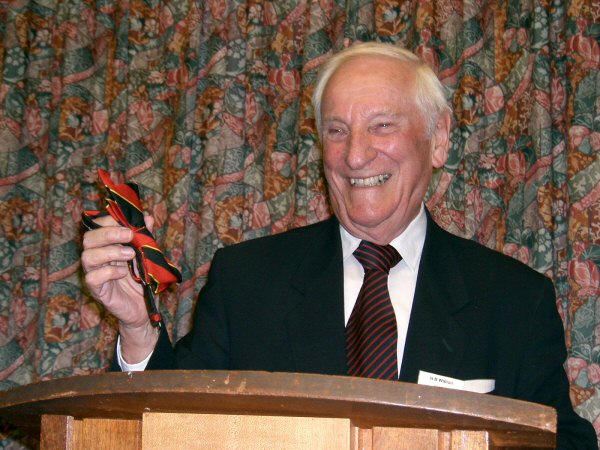
Wilkes Walton explains that he has inherited his late
friend Norman Sneesby's trademark Grammarian
dickie-bow tie: see also below |
